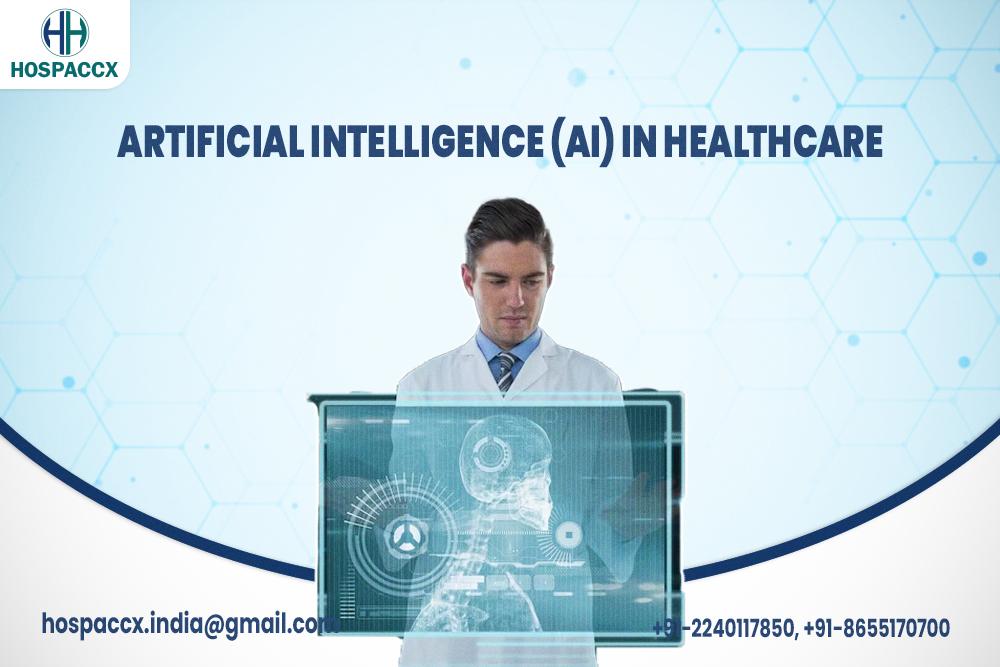ARTIFICIAL INTELLIGENCE (AI) IN HEALTHCARE
INTRODUCTION
Artificial Intelligence is a way of making a computer, a computer-controlled robot, or a software think intelligently, in the similar manner the intelligent humans think. Artificial intelligence has been one of the fastest-growing technologies in recent years. AI is associated to human intelligence with similar characteristics such as language understanding, reasoning, learning, problem solving, and others.
Artificial intelligence (AI) in healthcare is the use of algorithms and software to approximate human cognition in the analysis of complex medical data. AI has the potential to be used in planning and resource allocation in health and social care services.
Considering the above facts, Hospaccx team work on artificial intelligence in healthcare. This is macroficial study on Artificial Intelligence in Healthcare, if you want to get into more detail you can contact https://hospaccxconsulting.com/
HISTORY OF ARTIFICIAL INTELLIGENCE
Artificial Intelligence was first proposed by John McCarthy in 1956 in his first academic conference on the subject. The idea of machines operating like human beings began to be the centre of scientist’s mind and whether if it is possible to make machines have the same ability to think and learn by itself was introduced by the mathematician Alan Turing. Alan Turing was able to put his hypotheses and questions into actions by testing whether “machines can think”. After series of testing (later was called as Turing Test) it turns out that it is possible to enable machines to think and learn just like humans. Turing Test uses the pragmatic approach to be able to identify if machines can respond as humans.
APPLICATIONS OF ARTIFICIAL INTELLIGENCE IN HEALTHCARE
- Managing Medical Records and Other Data
Since the first step in health care is compiling and analysing information (like medical records and other past history), data management is the most widely used application of artificial intelligence and digital automation. Robots collect, store, re-format, and trace data to provide faster, more consistent access.
- Doing Repetitive Jobs
Analysing tests, X-Rays, CT scans, data entry, and other mundane tasks can all be done faster and more accurately by robots. Cardiology and radiology are two disciplines where the amount of data to analyse can be time consuming.
- Treatment Design
Artificial intelligence systems have been created to analyse data – notes and reports from a patient’s file, external research, and clinical expertise – to help select the correct, individually customized treatment path.
- Digital Consultation
Apps like Babylon in the UK use AI to give medical consultation based on personal medical history and common medical knowledge. Users report their symptoms into the app, which uses speech recognition to compare against a database of illnesses. Babylon then offers a recommended action, taking into account the user’s medical history.
- Virtual Nurses
The start-up Sense.ly has developed Molly, a digital nurse to help people monitor patient’s condition and follow up with treatments, between doctor visits. The program uses machine learning to support patients, specializing in chronic illnesses.
In 2016, Boston Children’s Hospital developed an app for Amazon Alexa that gives basic health information. The app answers asked questions about medications and whether symptoms require a doctor visit.
- Medication Management
The National Institutes of Health have created the AiCure app to monitor the use of medication by a patient. A smartphone’s webcam is partnered with AI to autonomously confirm that patients are taking their prescriptions and helps them manage their condition. Most common users could be people with serious medical conditions, patients who tend to go against doctor advice, and participants in clinical trials.
- Drug Creation
Developing pharmaceuticals through clinical trials can take more than a decade and cost billions of dollars. Making this process faster and cheaper could change the world. Amidst the recent Ebola virus scare, a program powered by AI was used to scan existing medicines that could be redesigned to fight the disease.
The program found two medications that may reduce Ebola infectivity in one day, when analysis of this type generally takes months or years – a difference that could mean saving thousands of lives.
- Precision Medicine
Genetics and genomics look for mutations and links to disease from the information in DNA. With the help of AI, body scans can spot cancer and vascular diseases early and predict the health issues people might face based on their genetics.
- Health Monitoring
Wearable health trackers – like those from Fit Bit, Apple, Garmin and others – monitors heart rate and activity levels. They can send alerts to the user to get more exercise and can share this information to doctors (and AI systems) for additional data points on the needs and habits of patients.
- Healthcare System Analysis
In the Netherlands, 97% of healthcare invoices are digital. A Dutch company uses AI to sift through the data to highlight mistakes in treatments, workflow inefficiencies, and helps area healthcare systems avoid unnecessary patient hospitalizations.
CLINICAL DATA GENERATION
The road map from clinical data generation to natural language processing data enrichment, to machine learning data analysis, to clinical decision making. EMR, electronic medical record; EP, electrophysiological.
ARTIFICAL INTELLIGENCE IMPACT ON HEALTHCARE
1. Bringing Intelligence to Medical Devices and Machines
In the medical environment, smart devices are critical for monitoring patients in the ICU and elsewhere. Using artificial intelligence to enhance the ability to identify deterioration, suggest that sepsis is taking hold, or sense the development of complications can significantly improve outcomes and may reduce costs related to hospital-acquired condition penalties.
2. Advancing the use of Immunotherapy for Cancer Treatment
Immunotherapy is one of the most promising avenues for treating cancer. By using the body’s own immune system to attack malignancies, patients may be able to beat stubborn tumors. However, only a small number of patients respond to current immunotherapy options, and oncologists still do not have a precise and reliable method for identifying which patients will benefit from this option.
Machine learning algorithms and their ability to synthesize highly complex datasets may be able to illuminate new options for targeting therapies to an individual’s unique genetic makeup.
3. Making Smartphone Selfies into Powerful Diagnostic Tools
Continuing the theme of harnessing the power of portable devices, experts believe that images taken from smartphones and other consumer-grade sources will be an important supplement to clinical quality imaging – especially in underserved populations or developing nations.
The quality of cell phone cameras is increasing every year, and can produce images that are viable for analysis by artificial intelligence algorithms. Dermatology and ophthalmology are early beneficiaries of this trend.
4. Revolutionizing Clinical Decision Making with Artificial Intelligence at the Bedside
As the healthcare industry shifts away from fee-for-service, so too is it moving further and further from reactive care. Getting ahead of chronic diseases, costly acute events, and sudden deterioration is the goal of every provider – and reimbursement structures are finally allowing them to develop the processes that will enable proactive, predictive interventions.
Artificial intelligence will provide much of the bedrock for that evolution by powering predictive analytics and clinical decision support tools that clue providers in to problems long before they might otherwise recognize the need to act.
GLOBAL ARTIFICIAL INTELLIGENCE MARKET
- Artificial Intelligence in Healthcare Market worth 7,988.8 USD Million by 2022, at a CAGR of 52.68% during the forecast period.
- North America, which comprises the US, Mexico, and Canada, dominates the overall AI in healthcare market.
- The US is a major contributor to the growth of the AI in healthcare market in North America Factors such as EMR, increasing focus on precision medicine, strong presence of leading companies engaged in developing AI solutions for healthcare, large number of cross-industry collaborations in this region, growing investments in the field of healthcare AI in this region, and high consumerization of personal care products are driving the growth of the AI in healthcare market in this region.
MARKET DRIVERS
- The market growth is mainly driven by factors such as the increasing adoption of cloud-based applications and services, growing big data, and increasing demand for intelligent virtual assistants.
CHALLENGES FOR AI MARKET IN INDIA
- Challenge is the availability of the right data. Data is the lifeblood of AI, and any vulnerability arising from unverified information is a serious concern for businesses.
- The biggest challenge is the scarcity of trained human resources; the existing workforce is not familiar with latest tools and applications.
- The AI technology is a big threat to redundant employees. The mass adoption of AI may cause a grave unemployment problem.
CONCLUSION
AI nowadays is being implemented in almost every field. One should be able to proceed with knowing and understanding the consequences of every technological trend in healthcare. It is an AI in healthcare revelation era and therefore; it should adopted and embraced for better society or healthcare services.





Related Team Members
Related Services
Other Industries
Related Blog
Related Success Stories











